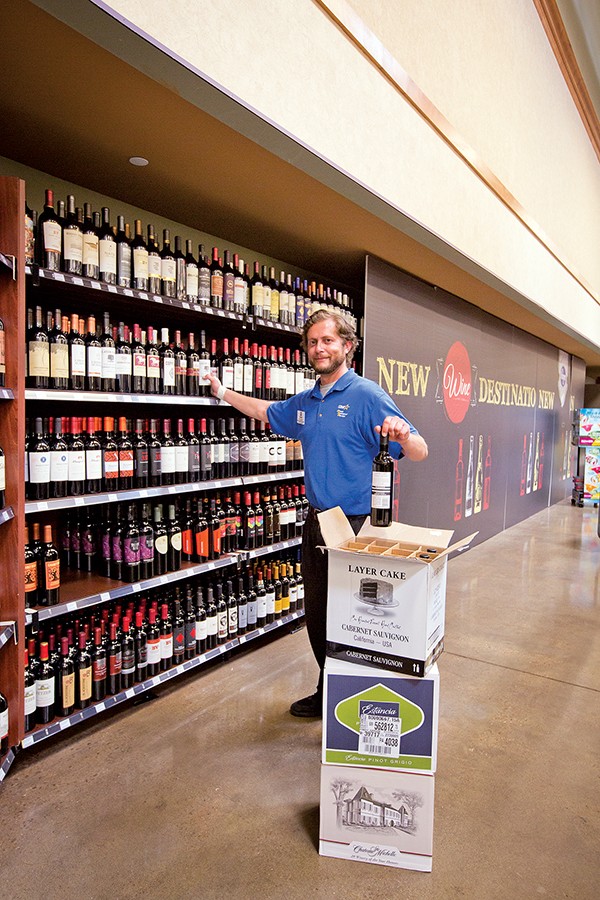Last week on a Memphis Twitter thread, the subject of restaurant takeout and delivery options arose. People began name-checking dining options and dishes and service they’d tried and liked. I suggested they should begin tweeting their best experiences, and in the process, give a shout-out to local restaurants who were trying to survive in these trying times. It went — pardon the expression — viral, with dozens of Memphians tweeting out their favorites over the course of a couple days.
We decided to use that spontaneous outpouring of support and love for our local restaurant community as the basis for this story — to offer some views from the trenches and find out how some of your favorite eateries are coping. — Bruce VanWyngarden

Pete & Sam’s
I long to sit in one of those big booths at Pete & Sam’s, beneath the enlarged photos of founder Sam Bomarito, his sister Vita Gattuso, and others involved in one way or the other with the popular restaurant.
For now, the meals I love still are available, but they’re takeout only. The restaurant is offering lunch and dinner curbside pickup, says Michael Bomarito. “We’ve got a kiosk out there,” he says. “A person sitting out there between 4 p.m. and 8 p.m. with a credit card reader.”
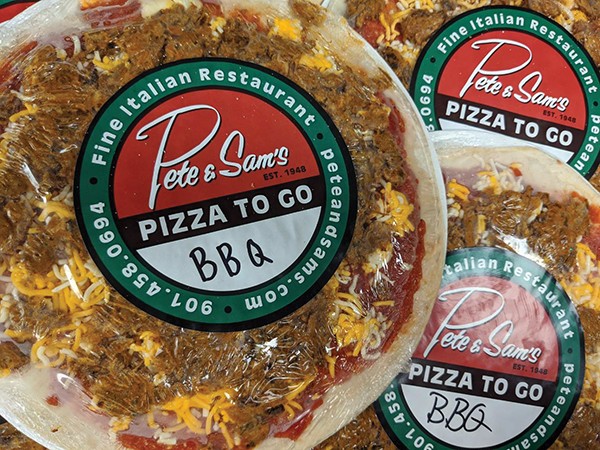
Pete & Sam’s also delivers all over, whether it’s Memphis, Bartlett, or Germantown, Bomarito says. “We’re coming to you. So that’s the end of that. We’ve got three or four drivers every day. We start at noon. Then we deliver all day until 8 p.m. during the week and 9 p.m. on Fridays. Back to 8 p.m. Sundays.”
As for the food, Bomarito says, “We’re pretty much doing 90 percent of the menu. A couple of things we pulled off. They weren’t big sellers. We didn’t want food to go to waste.” Available items include their frozen lasagna that serves three and frozen ravioli meat sauce. “We have people calling from all over the country wanting us to ship our stuff.”
The take-and-bake frozen pizzas are their hottest item, Bomarito says. You can build your own pizza by adding spinach or whatever topping you want. The pizzas are covered with shrink wrap at the restaurant, the Pete & Sam’s logo is added, and the pizza is ready to go. The frozen pizzas have been available over a year, but, Bomarito says, “The last couple of weeks people went crazy stocking up their freezer.” — Michael Donahue
3886 Park, (901) 458-0694, peteandsams.com

R.P. Tracks
“Tracks has never closed,” says Mary Laws, who, with her husband Bernard, has owned the beloved University of Memphis spot for the past five years. She’s worked there for 16. “Even when they did a huge remodel in 2000, Rick and Peter [the former owners] never closed.”
R.P. Tracks has been a haven for college-goers’ study breaks and professors’ and locals’ beer meet-ups for more than 30 years (33 in December, according to Mary).
 Mary Laws
Mary Laws
R.P. Tracks bartender Jeremy Allen delivers food curbside.
“Tracks has always been here for the people in this neighborhood and the city,” she says, noting the many regulars who’ve come in for burgers and nachos or sat at the bar for conversation through the decades. “I thought, even if they can’t come in, at least they know they can still get their favorite food. They’re still seeing the bartenders who have been waiting on them for years. It’s just that small interaction, I think, that gives people a little ray of sunshine.”
After a rocky start with low carryout sales the first couple of weeks, they’ve recently extended their hours. Customers can call ahead and order from the slightly limited food menu, which thankfully still includes the famous nachos (we’ll take the barbecue tofu, please!), burgers, wings, quesadillas, and more. To-go beers, cocktails, and shooters are also available.
“I cannot tell you how much I have been touched by the support of the community,” Mary says. “If I stop and think about it, I tear up because I’m so grateful, just beyond words.”
R.P. Tracks is open for curbside pickup from 11 a.m. to 9 p.m. daily. Give them a call to place your order, then call again when you arrive and they’ll bring it out to you. — Shara Clark
3547 Walker, (901) 327-1471, rptracks.com

Spindini/South Main Grocery
When the restaurant industry seemed to plummet overnight, Spindini owner Jim LoSapio had to reimagine his business model — and quick. He and his partner came up with a plan to flip the Downtown restaurant into a grocery store. Thus, in late March, South Main Grocery was born.
Shoppers will now find shelves and coolers stocked with a variety of grocery offerings, to-go dishes, and more, as well as household items including soap, cleaning supplies, paper towels, and the ever-elusive toilet paper.
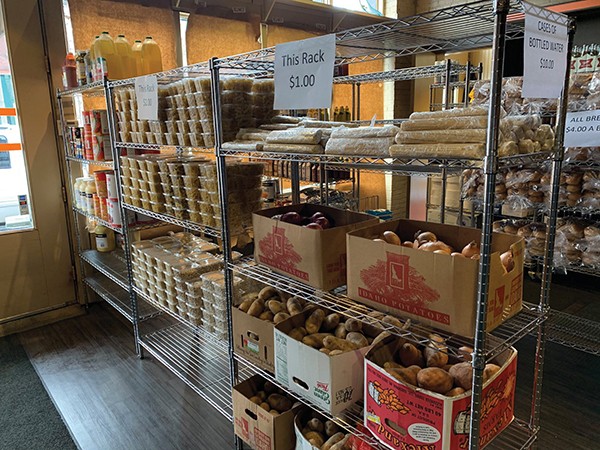
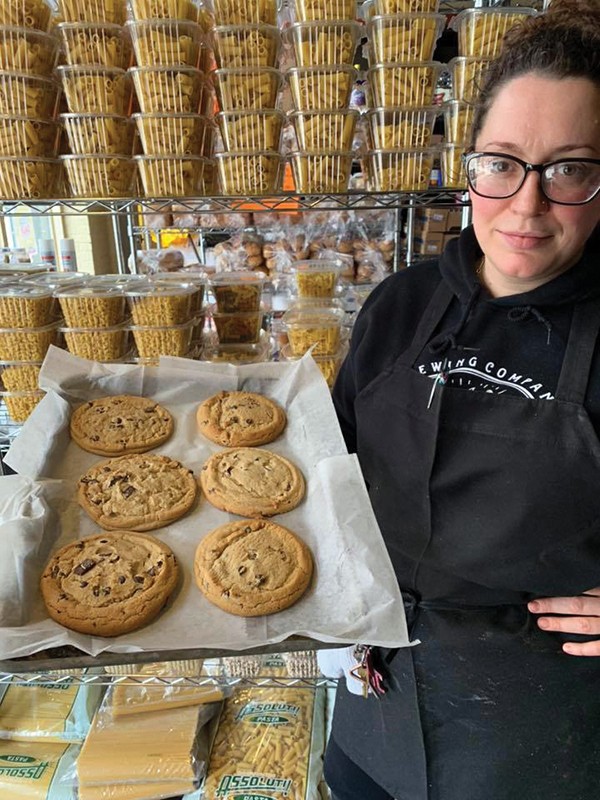 Spindini/South Main Grocery Facebook
Spindini/South Main Grocery Facebook
Spindini has become South Main Grocery for the time being.
“We’ve incorporated the grocery store ideas with some of the things that we did well as a restaurant,” LoSapio says. “We have grab-and-go lasagna and take-home par-baked pizzas. We’ve also incorporated things we do at our other restaurants as grab-and-go items, like gumbo and red beans and rice.”
They’re also hand-cutting fresh meat, with filets and ribeyes on offer, in addition to burger meat. Current seafood options include red fish, salmon, and shrimp. Also available: milk, orange juice, eggs, pastas, sliced bread, hoagie rolls, bagels, and freshly baked cookies, muffins, and more.
Their new dinner specials have taken off. “On Monday and Friday, we’re doing $25 smoked pork butt that we slow smoke for 11 hours,” LoSapio says. “Tuesday and Thursday, we roast chicken halves and serve them with a side for $12. Wednesdays, we’re doing pans of the awesome Spindini sausage lasagna that we’ve been doing for years. It feeds six to eight people.”
LoSapio is grateful. “South Main and Downtown is really helping us support what we’re trying to do and helping me create job opportunities for my staff. [A situation like this] really makes you appreciate the loyalty of the employees, the loyalty of the community — and proves that we’re strong and we’ll definitely get through it.” — SC
383 S. Main, (901) 578-2767, follow them on Facebook for more info

The Bar-B-Q Shop
In the South, barbecue is the unofficial food of community. It’s what Memphians pick up, by the pound, to celebrate family reunions and graduations. Out-of-town visitors usually want to know where the best barbecue joint is. And while the coronavirus has put gatherings on hold, barbecue is still grade-A comfort food, and we could all use a little comfort these days.
“Our customers have such different relationships with all of us. It’s just been challenging from that perspective because part of what we do is not just to-go food, it’s interaction,” says Eric Vernon, manager/owner of the Bar-B-Q Shop in Midtown. It’s been hard, but Vernon says he and his staff are adapting to providing the comfort food without the personal connection — at least for the time being.
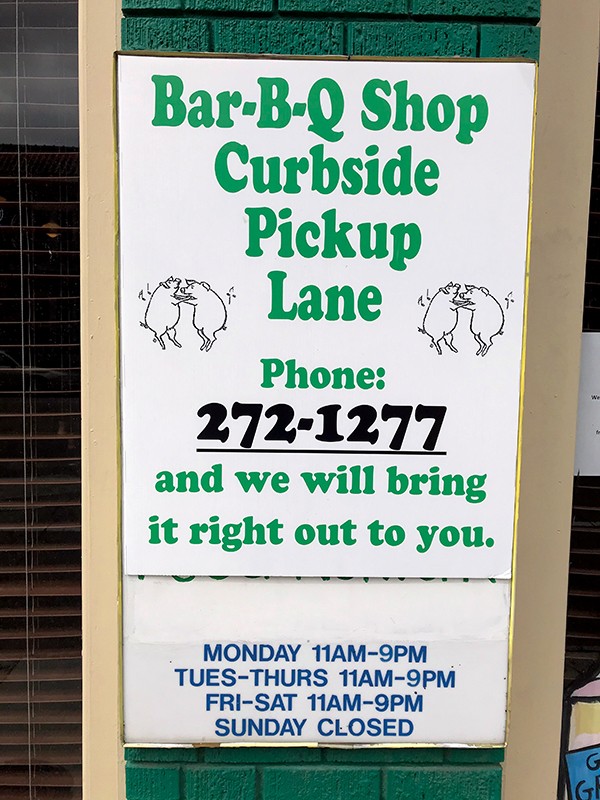 Jesse Davis
Jesse Davis
The store is offering to-go, curbside pickup, and specially priced bulk orders, or family packs. The Boston Butt Shoulder is $11.29 per pound, and the Beef Brisket is $15.49 per pound. Their famous Bar-B-Q Spaghetti is $21.99 per quart. To make getting your pulled pork fix easier, the folks at the Bar-B-Q Shop have designated the parking spots in front of the restaurant, marked by orange traffic cones, as the pickup area.
“We’re also, for the first time, doing DoorDash delivery, and we’re working on our online menu for our website,” Vernon adds, saying that he’s had calls and texts from regular customers with suggestions for how to best serve quarantined Memphians hungry for barbecue and how to best get the word out. “I get a tip every other day from people who are just wanting us to stay afloat.” Here’s to staying afloat through the storm — and to sharing community and comfort food once the storm passes. — Jesse Davis
1782 Madison, (901) 272-1277, thebar-b-qshop.com
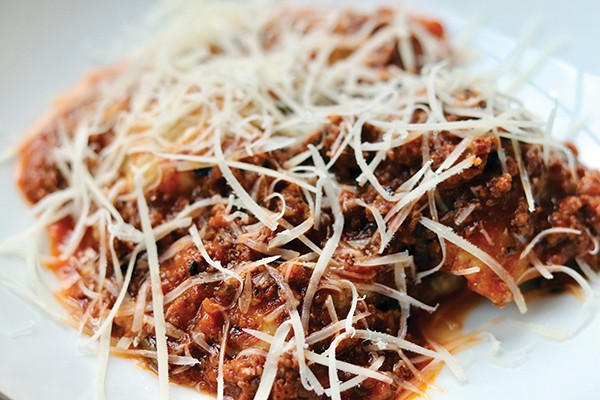
Maw Maw’s ravioli from the team of Andrew Ticer and Michael Hudman
Ticer and Hudman Restaurants
All is not lost if you still can order Maw Maw’s ravioli from Andrew Ticer and Michael Hudman. Ticer and Hudman are the chef/owners of a string of popular restaurants, which now are offering curbside pickup.
Nick Talarico, operations manager for the restaurants, described what each place is doing.
Andrew Michael Italian Kitchen “strictly does take-and-bake, and everything is cooked at [the customer’s] home,” Talarico says. “They do a family meal and an à la carte meal — like pastas and sauces. A lot of people are getting Maw Maw’s ravioli and taking it home and cooking it.”
Catherine & Mary’s and Gray Canary have teamed up at Catherine & Mary’s restaurant, he says. “They’re doing take-and-bake stuff as well as hot-and-ready items. They’re doing fun things. Like they did tamales one day. They’re doing a potato cake with neckbone gravy. Sort of a play on Hog & Hominy’s poutine. And then we also see a lot of our pastas — the hot and ready-to-eat pastas — as really successful down there.”
Bishop, he says, is “doing the same with hot-and-ready and takeout items — probably the Birdie [fried chicken, dill aioli, Calabrian honey] and the Bishop burger are the most popular.”
The restaurants are offering dinner, but Ticer and Hudman also rolled out Saturday and Sunday brunch at Andrew Michael Italian Kitchen and Catherine & Mary’s. “Like pancakes and quiche. And we’re doing grits. Doing a couple of different things.” — MD
Menus are updated daily on Instagram: @amitaliancooks, @catherine_marys, and @bishopmemphis.
Andrew Michael Italian Kitchen, 712 W. Brookhaven Circle, (901) 347-3569
Catherine & Mary’s, 272 S. Main, (901) 254-8600
Bishop, 545 S. Main, No. 111, (901) 896-0228
Vegan Options
Sure, a lot of folks are ordering takeout from restaurants, but how is that going for the Memphis vegan community?
Many vegans, of course, are accustomed to having fewer choices when dining out, and most are comfortable with cooking at home for that very reason. The closest they come to home deliveries may be those from local farmers. But now in Memphis, vegan takeout has become fairly common. One place making a name for itself in this regard would seem quite unlikely — a dive bar: the Lamplighter Lounge.

Laurel Cannito from The Lamplighter Lounge
“We have a few unique vegan options,” says co-owner and chef Laurel Cannito. “Our curry special, our vegan sausage, egg, and cheese, our veggie burger, and our veggie dog. People are into it. We’re open every day from noon until 1a.m. After midnight, we try to get people to pick up, but if we have someone who can’t leave their house, we’re not going to tell them no. We deliver to the Midtown area, free if the order’s over $20. Under $20, there’s a $3 delivery fee. But most people who have been ordering have tended to get a good bit of stuff.”
As with all restaurants these days, a new hygiene regime is in force at the Lamp. “We got N-95 face masks before there was a shortage,” says Cannito. “We have gloves and lots of hand sanitizer and disinfectant. And we have disinfecting protocols we use every night, so everything is properly cleaned.”
Many other vegan-friendly establishments are also delivering these days, of course. Some, like the Lamplighter or Cheffie’s Cafe, use DoorDash, others use UberEats. Most vegans have their go-to restaurants in town, often non-vegan kitchens that have vegan-friendly items, as with many Asian or Mediterranean restaurants. Crazy Noodle will tweak their standard recipes for vegans on request.
But comfort food may be the order of the day for most stressed-out Americans, and it’s in high demand. Cannito has to put me on hold several times as orders roll in on a Thursday night. “Our most popular vegan item?” she says, when she finally has a moment. She doesn’t have to pause. “Hands down, the veggie burger with fries.” — Alex Greene
Lamplighter Lounge, 1702 Madison, (901) 567-5322
The Second Line and Fino’s
It’s going to be a while before we can laugh on the patio at The Second Line, enjoy quiet conversations in the elegant Restaurant Iris, and smile inside the bright and cheerful Fino’s Italian Deli & Catering.
For now, Kelly English, chef/owner of these restaurants, is adapting to the times. “Iris and Second Line kind of combined into one delivery and pickup service,” he says. “And we’re focusing on meals that people can eat with their families. Our most popular thing is the crawfish étouffée, gumbo, and jambalaya. I think people want to hug right now. The closest thing we can get to a hug is from food that comforts us.”
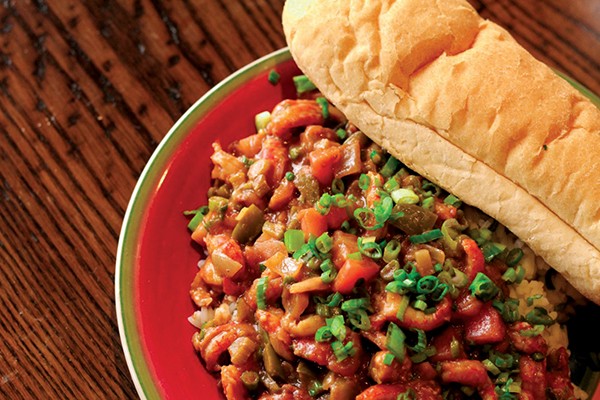 Caleb Sigler
Caleb Sigler
Crawfish Étouffée from The Second Line/Restaurant Iris
Fino’s is doing call-in/to-go and curbside. No one sandwich is the most popular, he says. “Everybody has their own favorite Fino sandwich. It really depends on who walks in that day.”
But, English says, “The most popular thing, by far, we’ve done at Fino’s is our program that lets us partner with citizens to feed first-line responders. For groups of 400, we deliver $500 worth of food to police stations or fire departments and a lot of other places you might not think about, like the health department, as first-line responders. We’ve been doing that at least once a day.”
English also is partnering with Roadshow BMW to provide daily lunches to hospital staff members who are treating COVID-19 patients. He posts daily reports on deliveries and other doings at his restaurants on Facebook. “I fight for my team. I fight for my people. And some of my people can’t eat right now. Tired is nothing compared to what some people are going through.” — MD
For information on menus, prices, and restaurant hours, go to irisetc.com.
The Second Line, 2144 Monroe, (901) 590-2829
Fino’s Italian Deli & Catering, 1853 Madison, (901) 272-3466
Huey’s
The Huey burger is the definition of comfort food in Memphis. It’s a delicious reminder of good times.
As the chief operating officer for Huey’s nine locations, Ashley Robilio helped formulate the company’s response to the COVID-19 crisis. “We spent a good portion of the first two weeks in March just talking about strategy, and talking about all the what-ifs,” she says. “Everyone was so worried, and all of our employees were so scared. We really tried to calm them down and be as positive as we could. … We were probably one of the first restaurants that started social distancing. Even the term ‘social distancing’ was pretty unknown in Memphis for a while, so we got that part pretty quickly.”
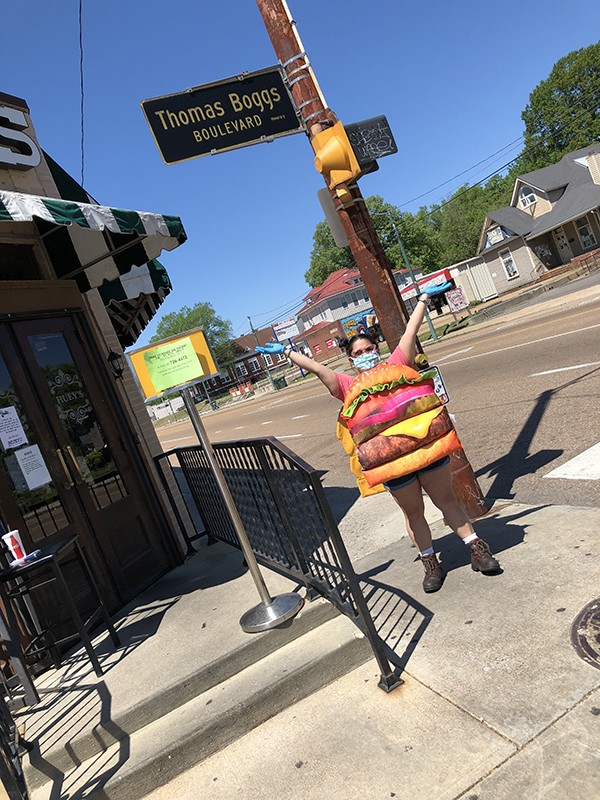 Courtesy of Huey’s
Courtesy of Huey’s
When the shutdown orders came, the Memphis locations went first, followed a couple of days later by the suburban stores. Very quickly, Huey’s went to curb service and takeout only. Robillio says the transition went fairly smoothly. “We have decided to not do any layoffs,” Robillio says. “We’ve got a lot of obviously very good PR and thanks from all of our employees. I mean literally, some of our employees were in tears when they heard.”
The restaurant chain tapped its savings and, after some initial confusion, secured a Small Business Administration disaster assistance loan to keep their employees on the payroll. They kept employees at full pay with shortened hours and tweaked their to-go offerings. “We did take a few of the menu items off, either ones that had a lot of prep time or that don’t travel well, like nachos.”
Having a Huey burger delivered to your domicile seems like getting a message from a saner time. The Madison Avenue burger, which adds melted swiss cheese, mushrooms, and bacon to Huey’s juicy beef patty on a sourdough bun, is a deep menu cut that’s worth it. For the non-beef options, the Cajun-seasoned, grilled tuna steak sandwich is always delicious. Huey’s serves the classic steak cut fries, but a basket of tater tots or onion rings is an excellent alternative. Our recent order had encouraging messages hand-written on the takeout box. “We have gotten so many comments about the notes that we’ve written on these boxes, and some of them have gotten quite creative.”
In the coming days, Huey’s expects to roll out more ordering and delivery options and introduce a catering menu aimed at families and groups. They have already been filling large orders donors have bought to feed places like Hope House.
Robilio says she’s been in constant contact with others in the Mid-South restaurant community. “We’ve heard from a lot of different people, wanting our advice, wanting to know what we’re going to do, when we’re going to do it, and how we’re going to do it. We’ve obviously shared some things with anybody who asks. It is a community effort, and anything we can do to help the restaurant community, we want to do it. We’ve always been like that. My dad loved helping other restaurants. He loves helping anybody, and we’ve tried to stay with that same mentality.” — Chris McCoy
multiple locations, hueyburger.com

Beer!
Craft beer is essential. Local, state, and federal officials have (finally) confirmed this fact — one that I’ve known all along. In this virus world of isolation, I consider beer essential sanity supplies.
Now, it’s not the same. I like sitting at the bar and catching up with friends over pints. But, thankfully, you can still at least get those beers and bullshit with your buds over Zoom. (Still nope, though. Not even close to the same. Alas.)
Tons of local rules were relaxed on beers and breweries as stay-at-home orders came down late last month. Bars, restaurants, and breweries were allowed to offer curbside pickup and delivery.
This relentless global tragedy offers little in the way of comfort and joy. To endure, I’ve been counting every small grace I can find. One of them was the first time I ever grabbed a to-go beer from the Young Avenue Deli. I placed a dinner order over the phone and also requested a local draft beer, a 22-ouncer. What would this look like? How would it come? On my walk to pick up my order, I reveled in a daiquiri-stand fantasy of a big-ass styrofoam cup with a piece of tape over the straw hole. However it came, I knew I’d be sipping that beer on the walk home.
My fantasy wasn’t far off. It came in that plastic, Midtown-iconic Deli cup. No tape on the top, but it did have a lid with that straw hole. Plenty good enough for me. The whole thing was just … different, and felt sort of illegal. Drinking it on the way home felt deliciously rebellious.
Most Memphis restaurants are offering up curbside beer pickup and delivery. They are allowed to, at least. Many have wondered if that service will remain after social distancing orders are lifted. Seems like it’d be tough to walk it back now.
Most of Memphis’ craft breweries are offering pickup or delivery. Here’s a quick look at what they’re offering:
Meddlesome — Curbside pickup and delivery. Call (901) 207-1147 to order.
Ghost River — Curbside pickup and delivery. One case minimum on deliveries and you must live inside Memphis city limits. Call (901) 661-4976 to order.
Wiseacre — Curbside pickup and delivery. One case minimum for deliveries and only for addresses within a 10-mile radius of the brewery. Order form at wiseacrebrew.com.
Crosstown — Curbside pickup and delivery. One case minimum for deliveries with a $5 delivery fee. Order at crosstownbeer.com.
High Cotton — Stopped all pickup and delivery services Monday, April 6th. “We feel this is in the best interest of our community and employees,” reads a statement from the brewery. Cans and growlers are still available in stores and restaurants.
Memphis Made — Curbside pickup. Call (901) 207-5343 to order.— Toby Sells
The Brooklyn Bridge Restaurant
The Brooklyn Bridge has been an East Memphis fixture since 1985 and, since 1987, has operated in the Orleans Place Shopping Center near the intersection of Poplar and Kirby Parkway. It was the creation of Vincent and Bridgette Correale, first-generation Italian Americans who came to Memphis from — where else? — Brooklyn. The place is still family-run, with the general manager and head chef being Giorgio Correale, son of the founders.
The entire menu, which runs from New York-style pizza to such specialties as chicken piccata, lasagna Amalfitano, portobello mushroom ravioli with shrimp, and mussels plates, is available for takeout, as well as delivery through the Postmates service. A Family Dinners menu, with numerous condiments and options, has been especially created for the stay-at-home circumstances of today. Hours are 4 to 8 p.m. Tuesday through Thursday, and 4 to 9 p.m. on Friday and Saturday. Bottles of wine are 50 percent off (with house wines and Cellar Reserve excepted).
Phone lines are open each day at 4 p.m., and orders may be placed at 901-755-7413. The management promises that anyone leaving a message will be called back. — Jackson Baker
1779 Kirby Parkway, Ste. 5, (901) 755-7413, brooklynbridgeitalian.com
Mortimer’s
Mortimer’s is upgrading its service during the coronavirus emergency, offering delivery, in addition to its existing curbside takeout service. East Memphis, in particular, is considered a major part of the restaurant’s bailiwick.
But owner/operator Christopher Jamieson, who lives in Germantown, is doing the best he can to make available the restaurant’s goodies (including growlers, wine, and takeout cocktails) on as wide a geographic basis as he can manage, doing many of the deliveries himself.
Alas, the establishment’s oyster specials, famously available on Tuesday and Saturday nights, are not on the takeout or delivery menu, but everything else is — including copies of the current Flyer issues (Mortimer’s being one of our regular pickup points). Not to mention the two rolls of toilet paper, still a scarce item, that go with all to-go orders.
The Jamieson family has long been in the restaurant business and operated the legendary (and now closed) Knickerbocker’s on Poplar for many years. Christopher Jamieson, the proprietor at Mortimer’s since 2013, says business has been better than he had first expected when the orders came down to close restaurants for on-site service. “The community has been very supportive,” he says. — JB
590 N. Perkins, (901) 761-9321, mortimersrestaurant.net

Chard from Rose Creek
Direct from Farmers
While sheltering in place, we’re all cooking more than ever, but how to get the raw materials for your cuisine? Many feel the safest option is to eliminate as much of the supply chain as possible and take deliveries directly from local farms.
Randy Alexander of Tubby Creek Farm says it makes a lot of sense to take advantage of their home-delivered produce, purely from the standpoint of hygiene. They ensure that all harvesters wash their hands and wear masks. From there, as he puts it, “The food goes directly from our field to the consumer, instead of to a warehouse chain, and then a grocery store, and through a bunch of people before it gets bought.”

Ray Tyler, of Rose Creek Farm, points out another advantage of home-delivered local produce. “Right now is when people need to be taking care of their immune systems more than ever,” he says. “Local, nutrient-dense food is not a silver bullet, but it’s a good idea to eat more of it.”
As fate would have it, Rose Creek was already ramping up its online ordering in recent years, with a small fee for home delivery. But a sense of community service caused Tyler and his wife Ashley to reconsider that. “We really wanted to do our part in making this time a little easier,” he says. “So we started offering free delivery to everybody in Corinth [Mississippi], Selmer, Henderson, Jackson, Germantown, Collierville, and Memphis.”
Luckily, the shut-in policy took hold just as farms were rolling out their spring crops. “We’re hitting our peak,” says Tyler, who notes that they now are flush with carrots, scallions, spring greens, spinach, lettuce, herbs, radishes, arugula, and beets.
Meanwhile, Tubby Creek begins making their weekly deliveries of pre-sold subscriptions this Wednesday, even as they sell surplus crops via individual online orders. Rose Creek is mostly taking the latter approach. “Our customer base has increased 100 percent,” says Tyler. “Especially in Memphis. So this has relaunched this new local food resurgency. I think people realize that in times like this, it’s a really good idea to know your local farmer.” — AG
Tubby Creek, tubbycreekfarm.com
Rose Creek, rosecreekfarmstore.com
Uncle Lou’s Fried Chicken
Uncle Lou’s Fried Chicken in Whitehaven, known for its crispy chicken breast dipped in sweet and spicy sauces and honey butter biscuits, closed its dining room a day before it was mandated by Memphis Mayor Jim Strickland.
Louis “Uncle Lou” Martin, the owner of Uncle Lou’s, says since then it’s been a “weird time,” but the restaurant is working to adapt. “We are struggling along,” he says. “But I’m fortunate we’re still open.”
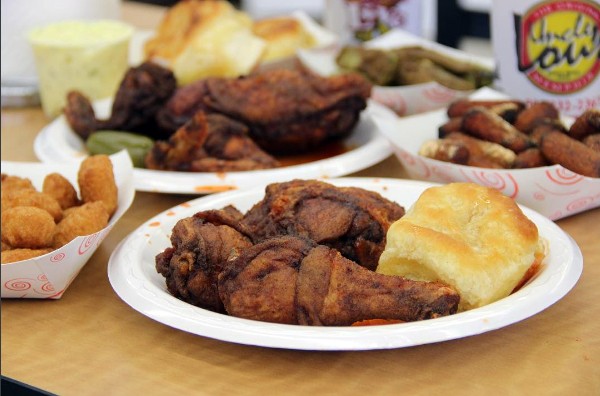
Apart from frying chicken to perfection, Martin says his priority has been keeping his employees and customers healthy. Last week, he says he constructed and installed a sneeze guard at the restaurant’s counter. Additionally, he says, “We’ve been sanitizing like crazy. I have one guy whose only responsibility is keeping the restaurant clean.”
The restaurant is offering carryout and delivery through apps like Grubhub and UberEats. He’s been encouraging customers to make call-in orders to minimize social gatherings in and around the restaurant.
Martin says he has been in the food business since he was a junior in high school, and in the past few weeks he’s been challenged more than he has in nearly 45 years. Sales have dropped, and Martin says the restaurant isn’t making any money, but “We are making enough to pay staff and pay most of the bills.” Martin recently took a salary cut in order to keep all of his staff employed.
Uncle Lou’s serves a lot of travelers, he says. And the restaurant’s biggest money-maker has always been from people dining in. “First and foremost, I want to make it through this,” Martin says. “And I want my staff to make it through this with good health. When it’s over, I might have to reassess and make some changes. But we have to survive this first.” — Maya Smith
3633 Millbranch, (901) 332-2367, unclelousfriedchicken.com
Buster’s Liquors & Wines
Considering what a drastic change it was going from in-store to curbside sales at Buster’s Liquors & Wines, president and co-owner Josh Hammond is satisfied with how it’s going. “We shifted to just online sales, which we did for our employee safety and hopefully send a message to the community,” he says. “It’s been sort of amazing that we’ve been able to do the curbside pickup all reliant on our eCommerce system that we already had in place.”
Just before Buster’s made the switch, they were slammed almost like holiday business. “We saw significant increase there, but it was completely hectic and stressful seeing this many people in the stores,” Hammond says. “It was just too difficult to maintain. We saw a 30 percent drop-off the first week as we adjusted, and that was just from normal business. And then we saw a 15 percent increase the following week. This third week, things were just right in line with last year. So we’ve kept up.”
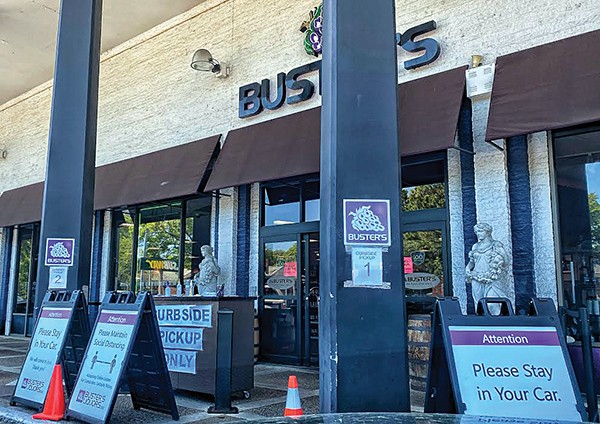 Jon W. Sparks
Jon W. Sparks
A big challenge has been compliance with coronavirus standards. “Getting masks for our employees has been an incredible task. They were ordered but got delayed. But I had a customer who gave us 200 of them.”
After ordering from the website, you get a confirmation and then later a notice that it’s ready for pickup. Parking spots are designated, and they have security directing traffic. The ordering feature is cut off at 5 p.m. so they can fill all the orders for that day. They tried delivery, but the influx of orders overwhelmed what they could do. They’re working on fixing that. — Jon W. Sparks
191 S. Highland, (901) 458-0929, bustersliquors.com


